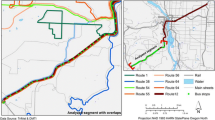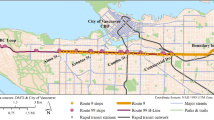Abstract
In this paper, archived Automatic Vehicle Location and Automatic Passenger Counter data are used to evaluate actual bus running time variation in relation to scheduled service for Tri-Met, the transit provider for the Portland, Oregon metropolitan area. Given observed variation in running times, scheduled recovery times are found to be generally (though not universally) excessive. This results in an under-investment of resources in revenue service relative to non-revenue service. Analysis of trip level data reveals that bus operators are an important source of running time variation after controlling for such factors as route design, time of day and direction of service, and passenger activity.
Similar content being viewed by others
References
Abkowitz M & Tozzi J (1987) Research contributions to managing transit service reliability. Journal of Advanced Transportation 21: 47–65.
Benn HP (1995) Synthesis of Transit Practice 10: Bus Route Evaluation Standards. Transit Cooperative Research Program, Transportation Research Board, National Research Council, Washington, DC.
Bruun E (2000) Using intelligent transportation systems (ITS) for planning. Urban Transport International 32: 38–39.
Casey R (2000) What have we learned about Advanced Public Transportation Systems? In What Have We Learned About Intelligent Transportation Systems? Volpe Transportation Systems Center, Federal Highway Administration, US Department of Transportation, Chapter 5.
Coffel B & Ferguson S (1993) Tri-Met Scheduling Practices. Portland, OR: Tri-Met.
Fielding G (1987) Managing Public Transit Strategically: A Comprehensive Approach to Strengthening Service and Monitoring Performance. San Francisco, CA: Jossey-Bass Publishers.
Furth PG (2000) Synthesis of Transit Practice 34: Data Analysis for Bus Planning and Monitoring. Transit Cooperative Research Program, Transportation Research Board, National Research Council, Washington, DC.
Gabriel S, Mattey J & Wascher W (1995) The demise of California reconsidered: Interstate migration over the economic cycle. Federal Reserve Bank of San Francisco Economic Review (2), 30–45.
Levinson HS (1991) Synthesis of Transit Practice 15: Supervision Strategies for Improved Reliability of Bus Routes. National Cooperative Transit Research and Development Program, Transportation Research Board, National Research Council, Washington, DC.
Pine R, Niemeyer J & Chisholm R (1998) Transit Scheduling: Basic and Advanced Manuals. TCRP Report 30, Transit Cooperative Research Program, Transportation Research Board, National Research Council, Washington, DC.
Rhoads T & Gerking S (2000) Educational contributions, academic quality, and athletic success. Contemporary Economic Policy 18: 248–258. Strathman J, Dueker K, Kimpel T, Gerhart R, Turner K, Taylor P, Callas S & Griffin D (2000) Service reliability impacts of computer-aided dispatching and automatic vehicle location technology: A Tri-Met case study. Transportation Quarterly 54(3): 85-102.
Strathman J, Kimpel T, Dueker K, Gerhart R, Turner K, Griffin D & Callas S (forthcoming) Bus transit operations control: Review and an experiment involving Tri-Met's automated bus dispatching system. Journal of Public Transportation.
Tri-Met (1989) Tri-Met Service Standards. Portland, OR: Tri-Met.
Tri-Met (2000a) Tri-Met Stop Level Passenger Census: Spring 2000. Portland, OR: Tri-Met.
Tri-Met (2000b) Tri-Met Route Performance Report: Detailed Trip Report, Spring 2000. Portland, OR: Tri-Met.
Tri-Met (2000c) Tri-Met Time of Day Route Performance Report: Spring 2000. Portland, OR: Tri-Met.
Author information
Authors and Affiliations
Rights and permissions
About this article
Cite this article
Strathman, J.G., Kimpel, T.J., Dueker, K.J. et al. Evaluation of transit operations: data applications of Tri-Met's automated Bus Dispatching System. Transportation 29, 321–345 (2002). https://doi.org/10.1023/A:1015633408953
Issue Date:
DOI: https://doi.org/10.1023/A:1015633408953




